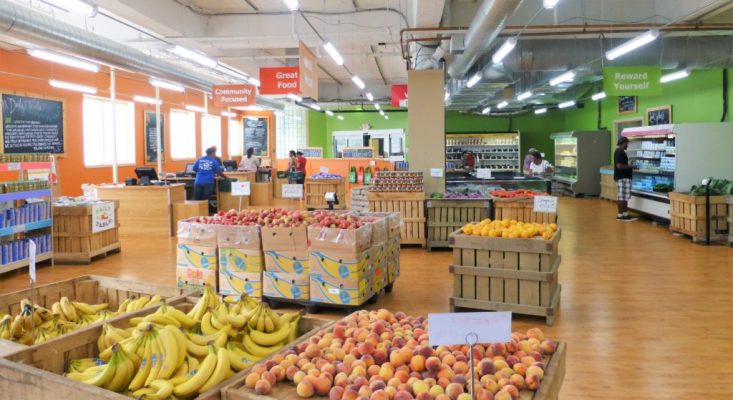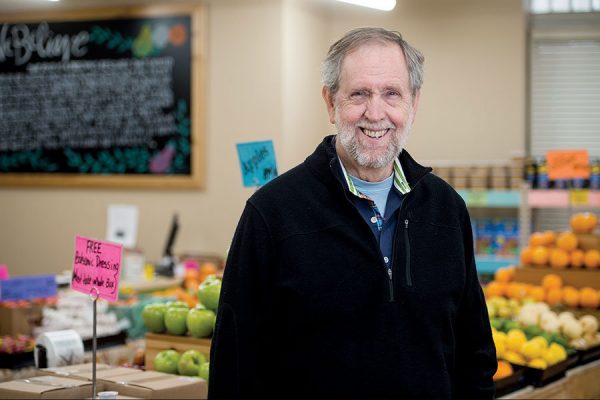By Kayla Vestergaard
“Aim higher,” Mr. Rauch began. With open arms and an easy laugh, the retired president of Trader Joe’s and founder of the low-income serving supermarket Daily Table, opened his February 26th talk with the time he was invited to make the first pitch at a Cubs game. Skeptical about a manager’s warning to aim well above the catcher’s head but deciding to trust the man’s experience, he aimed so high he worried the catcher would have to jump for it. Though he braced for embarrassment, he watched in shock as the pitch landed a perfect strike.
Experienced pitchers are aware that the front foot lands on the pitcher’s mound about six inches lower than the back foot. Mr. Rauch wasn’t anticipating this, but he knew to trust those with firsthand knowledge. On a similar premise, he founded Daily Table, hiring only people from the same low-income communities they serve and giving them an active role in food selection and pricing. Daily Table, with locations in Roxbury and Dorchester and a third on the way this year, “aims higher” than traditional supermarkets by providing healthy, inexpensive food to those who otherwise could not afford it.

The supermarket began in reaction to rising national trends of food insecurity and obesity. From 1990 to 2010, U.S. obesity had risen more than 20%, concentrated in low-income areas. However, stigmas against being overweight and poor have delayed market-based innovations that would truly help. Efforts have also been slow because American hunger takes a surprising face: rather than lacking calories, it lacks a diversity of nutrients. Even with the federal Supplemental Nutrition Assistance Program (SNAP), healthy food is too expensive, and the most affordable foods are laden with refined sugars, salt, and saturated fat. To fight the traditional American diet, the Daily Table only stocks healthy food – you won’t find any candy or soda there! Employees set the prices, knowing what their fellow community members are able to afford. Upon employee request, the supermarket also has a kitchen that prepares fresh meals that match the prices of fast food stores across the street. For the parents who have the time and children who are eager to learn, the kitchen also provides free cooking lessons a few times a week.
Daily Table’s social bottom line is supported by its environmental one. In order to provide food at affordable prices, there are only 500 products, far lower than Trader Joe’s 3-4,000, or a typical grocery store’s 40-50,000. Having a smaller inventory makes it easier to source products from farms and manufacturers willing to sell goods that are nearing their code dates at lower prices. Code dates, such as sell buy, use by, and best buy, are not federally regulated and are used arbitrarily across the food industry to sell more goods. In buying perfectly good food closer to their code dates, the Daily Table reduces wasted food, a phrase Mr. Rauch uses in place of “food waste” to remind that this is food is consumable, and not just scraps or by-products.

The non-profit supermarket chain, which needs to serve at least 75% low-income residents to receive federal funding and remain a non-profit, has tremendous potential for social impact as it expands. It’s already proven that it reaches more people in need than traditional food outreach methods. According to Feeding America, 38% of Americans who meet the need don’t go to food banks and pantries. They are ashamed of their situation, and the last thing they want is a handout. However, Mr. Rauch commends food banks and pantries for their essential work, noting that Daily Table partners with the Greater Boston Food Bank to donate the supermarket’s surplus.
Still, Daily Table has faced some difficulties from its business model. When Mr. Rauch founded it, he, like many, was unaware of options beyond the standard layouts for for-profit and non-profit. Proving to the IRS the supermarket deserved a non-profit status and wasn’t merely a discount grocery trying to avoid taxes was the first challenge; once it proved itself, the struggle with financial sustainability began. Fortunately, the clearest solution to getting out of the red is to continue to scale and replicate, since as additional stores are added, overhead costs will be disbursed. The existing kitchen is large enough to provide for the other stores, and by 2023 the supermarkets will turn a profit. Mr. Rauch admits that, ideally, he would have thought of becoming a for-profit benefit corporation and thus been able to raise equity. A transition in business model seems unlikely in the near future, though, given reliance on federal funding, volunteers, and donations from Amazon Fresh.
Nonetheless, Daily Table is already making a dramatic difference in the lives of local low-income residents. As the president of SNAP said years ago after a walk-through, this may be the only store where one can eat healthy for a month purely on a Massachusetts SNAP budget of $194 a month. To ensure it remains this way, employees repeatedly test this themselves with their free monthly meal plan available on their website. Lastly, the workers are paid $15 an hour, which, in addition to bettering their lives and increasing productivity, actually creates a net savings by avoiding high turnover rates. By caring for the social and environmental needs of its community first, Mr. Rauch has ensured Daily Table “aims higher”.


